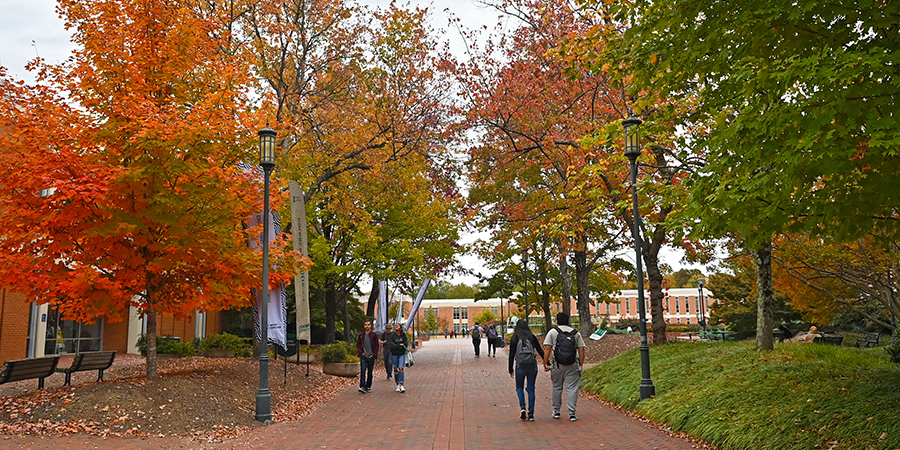
UNC System highlights program during Suicide Prevention Week, linking early training to long-term student well-being.
In North Carolina, suicide is the second leading cause of death in young people ages 10-18, according to the NC Department of Health and Human Services.
That’s why, in the coming academic year, the University of North Carolina System will work to support mental health for K-12 students, with plans to train up to 420 future teachers and principals in Youth Mental Health First Aid. The announcement coincides with National Suicide Prevention Week, which runs September 7-13, and is an annual campaign to educate the public about suicide prevention and warning signs.
Roughly 14% of college students in the U.S. have had serious thoughts of suicide in the past 12 months, data from the Healthy Minds Network show. This strains the counseling and outreach services offered by institutions. The MHFA initiative is designed to develop broader support for anyone who may be struggling.
The UNC System’s Mental Health First Aid (MHFA) effort, in partnership with the North Carolina Community College System and North Carolina’s private colleges and universities, has now trained more than 10,000 people, including students, faculty and staff, in adult-focused MHFA as part of a $1 million initiative launched in 2021. MHFA is an evidence-based training program that equips people to support and assist anyone experiencing a mental health crisis.
More than 400 individuals trained by the UNC System are now certified to teach MHFA.
“Recognition of mental health challenges helps our community members to support students, and to prevent harmful behaviors, including substance abuse, self-harm and suicide,” said Kelley Greer, behavioral health programs consultant for the UNC System. “The MHFA program is also a tool that helps students recognize mental health challenges in themselves, allowing them to seek support when they need it.”
Sherri Rajesh, a graduate student at Appalachian State University, completed MHFA training during her undergraduate years at App State and says it was a turning point in how she viewed mental health, not just as a personal topic but as a community responsibility in her job as a resident assistant.
“The training helped me recognize early warning signs of mental distress, gave me language to approach difficult conversations, and equipped me with confidence to respond rather than freeze in the moment,” Rajesh said.
Today, Rajesh serves as a graduate assistant for residence life while she pursues her master’s degree in social work from App State. She recalls helping one overwhelmed and depressed student, moving them away from isolation and toward community resources and support. She assisted another through a panic attack during finals week.
“I remembered the MHFA strategies for staying calm, offering support without judgment, and ensuring safety without overstepping. Just knowing how to respond in a way that’s informed and compassionate made all the difference!”
In the coming academic year, the focus of the UNC System’s MHFA programming will shift further toward reaching middle and high school students, helping build youth resilience and mental health before students reach college.
“We have a responsibility to serve all North Carolinians, and that means strengthening student mental health earlier in their educational journey,” said Suzie Baker, assistant vice president for student affairs for the UNC System. “Reaching K-12 students begins with preparing our teachers and school leaders. Our role is to ensure future educators can recognize signs of mental health challenges and are equipped with the knowledge and skills to support young people when they need it most.”
The UNC System leads the North Carolina Teaching Fellows program, which offers forgivable loans and tuition assistance to undergraduates who are committed to teaching in high-need fields in North Carolina public schools. Similarly, the NC Principal Fellows program invests in the education of high-quality school leaders to positively impact student achievement and school culture.
Baker and Greer, along with Kristen Moran, training specialist, and Kim Mitchell, director for student engagement, will lead several youth MHFA trainings for hundreds of individuals in both the Teaching Fellows and Principal Fellows programs over the coming academic year. The sessions will be paid for by both programs and offered at no cost to the fellows.
Rajesh applauds any effort to reach K-12 students with mental health support, especially as young people learn to deal with increasing academic and life stressors. That work could be transformative, she says, since so many health challenges first emerge in adolescence. “If future teachers are trained in MHFA, they’ll be better prepared, not only to spot signs of distress, but to help normalize mental health conversations in their classrooms,” Rajesh said. “That early support can be life-changing.”
If you or someone you know is experiencing a mental health crisis, call or text 988 or chat with the 988 Suicide & Crisis Lifeline at 988lifeline.org.